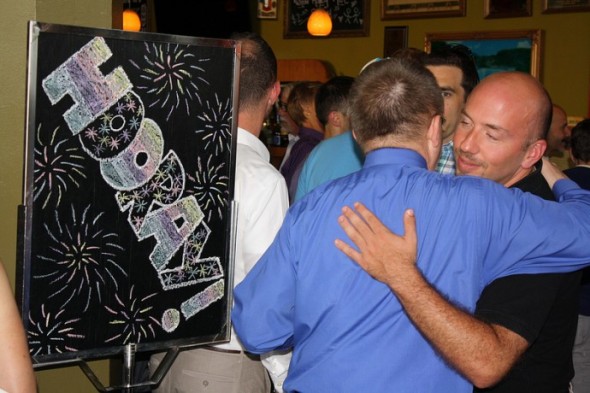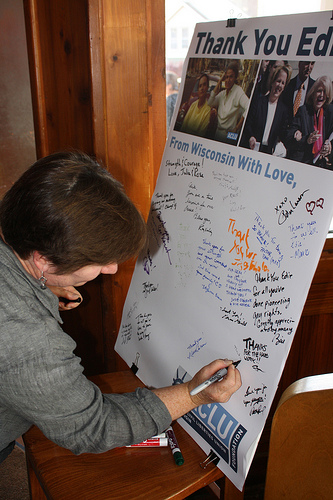Gays Ponder Supreme Court Decision
Extension of federal benefits will help them, but this state's ban on same sex marriages leaves barriers.

Attendees celebrated the Supreme Court’s decision that DOMA is unconstitutional at a “Day of DOMA Decision” event at Stonefly Brewery. (Photo by Maggie Quick)
The ramifications for Milwaukee residents of the Supreme Court’s rulings in favor of marriage equality will take time to sort out because of Wisconsin’s constitutional amendment banning same-sex marriage in the state, according to advocates for LGBT rights.
It is not clear when or if all federal benefits for spouses will flow to same-sex couples in Wisconsin who were married in another state, now that provisions in the federal Defense of Marriage Act have been overturned. In the case of United States v. Windsor, the Supreme Court ruled that same-sex married couples can receive all of the federal benefits available to heterosexual married couples if they live in states where their marriage is recognized.
“This is really complicated and it’s going to take us a while to know what it all means,” Kristin Hansen, development director of the ACLU of Wisconsin, said at a celebration the night of the decisions. “Everybody needs to be patient, but clearly this is a good thing.”
Still, ACLU of Wisconsin legal advisor Larry Dupuis believes some benefits will come fairly quickly, including the right of U.S. citizens to file for a green card for their same-sex spouse.
“What [immigration officials] care about is whether your marriage was legal where you were married — it’s portable,” Dupuis said. “Military [benefits] also seem to be portable.”
However, other benefits depend on where a gay married couple resides. “The IRS looks to see if you’re married where you live,” Dupuis said. “That could change by regulation or executive order. It will take some time but will almost certainly happen.”

An attendee signs a card for Edie Windsor, the defendant in the DOMA case. (Photo by Maggie Quick)
For same-sex married couples to receive Social Security survivor and disability benefits, laws would need to change.
“That is going to be a bigger hurdle to overcome,” Dupuis said. “It’s going to be a problem unless Congress acts, and there’s at least one house of Congress where that will be difficult to get through.”
Dupuis, ACLU of Wisconsin Executive Director Chris Ahmuty and U.S. Attorney Jim Santelle held a legal debriefing the night after the decisions in United States v. Windsor and Hollingsworth v. Perry. In the latter, the Supreme Court upheld a lower court decision overturning Proposition 8, which barred same-sex marriage in California. Two days after that decision, same-sex marriage returned to the state.
Almost 100 LGBT community members and allies attended the “Day of DOMA Decision” event at Stonefly Brewery, 735 E. Center St., and heard representatives of the sponsoring organizations speak, including co-presidents Paul Williams and Anne Perry and board member Denise Cawley of the Milwaukee LGBT Community Center; Jason Burns, executive director of Equality Wisconsin; Paul Fairchild, president of Cream City Foundation; Hansen; Dupuis; and Santelle.
“When we planned this event I said we’d either be crying tears of joy or we’d be crying in our martinis,” Hansen said. “I’m so happy we’re crying tears of joy!”
Hansen also lauded Edie Windsor, the defendant in the DOMA case. Attendees signed a giant thank-you card for Windsor at the event.
“This is what we can accomplish as a community when we speak with one voice,” Burns said. “Our mission is forward, our job is forward.”
Santelle quoted U.S. Attorney General Eric Holder’s remarks affirming the decision, as well as a statement from the U.S. Office of Personnel Management, the government agency that implements federal benefits. He said such comments show the rulings are being taken seriously and the government is working to extend benefits to all.
Many of the attendees also expressed their happiness about President Obama’s positive response to the rulings. “I think the president’s response is very profound,” said Baraq Stein, program assistant for Equality Wisconsin. “It’s a message to the world.”
Christopher Willey came to the event to support his friends. “I’m celebrating a momentous occasion,” Willey said. “I lived in California during the initial Prop 8 [decision] and I was incredibly disappointed about that initial ruling … (but now) there is government support to back the people.”
Added Willey, “Like all things, I found out about it through a friend on Facebook, and I read the article with teary eyes.”
Burns said he too was emotional when he heard the rulings. “There is this moment of disbelief. When for so long you’ve been told by your government your relationship is not real, is not valid; [then] when you have that moment that they say it is valid … I broke down at my desk. I just had tears of joy.”
Fairchild called the day “bittersweet,” referring to the Supreme Court’s decision a day earlier to undo part of the Voting Rights Act.
Fairchild said the DOMA ruling could harm Wisconsin’s economy, especially because Wisconsin is adjacent to two states (Iowa and Minnesota) where gay marriage is legal.
“If you’re in a same-sex relationship and you live on a border town, why wouldn’t you cross for economic justice?” Fairchild said. “Why wouldn’t you take a job somewhere where you have equal rights rather than Wisconsin?”
Same-sex couples from Wisconsin who are now considering getting married in another state should consult with a lawyer first, according to Dupuis. He also said there are “After DOMA” fact sheets that explain the ruling in terms of bankruptcy rights, taxes, immigration rights and veterans information, among others.
Many of the celebration’s attendees thought the decisions would get the ball rolling for gay rights in Wisconsin.
“I think it’s a great momentum builder,” Burns said. “(This might start) some serious conversations about marriage equality in this state.”
Stein agreed. “For us, our fight is still kind of going on,” he said. “Now there’s going to be a sense of urgency, especially in urban areas in Wisconsin. This might instill a lot of activism.”
This story was originally published by Milwaukee Neighborhood News Service, where you can find other stories reporting on fifteen city neighborhoods in Milwaukee.






















What we have to concern ourselves with now is a brain drain, because Wisconsin does not permit same sex marriage. Already, two of my close friends have considered their future in a state that does not recognize their New York Marriage. We haven’t lost them yet, but others I know have made their mind up and left.
Because of these rulings and other states legitimizing same sex marriage, quality of life issues now include the dignity of having your relationship recognized and valued. Communities that do this are going to be attracting talented people and we are going to lose them.
@Jeff Yup. I definitely fear that with the current direction of Wisconsin and our backwards amendment banning Marriage Equality that good friends will begin to leave Wisconsin. I’ve had those very same conversations…
The fact of the matter is eventually LGBTs will leave Wisconsin for states that afford basic human rights. I think that advocacy groups in WI need to start with the UW academic institutions that would suffer great losses by losing LGBT talent. The fact of the matter is that LBGT faculty, researchers, and clinicians with great experience and large grant funding will be eye-candy for university in marriage equality states. When the state starts seeing grant money leave the state (from principle investigators that are LGBT), I think that there may be more motivation for change.